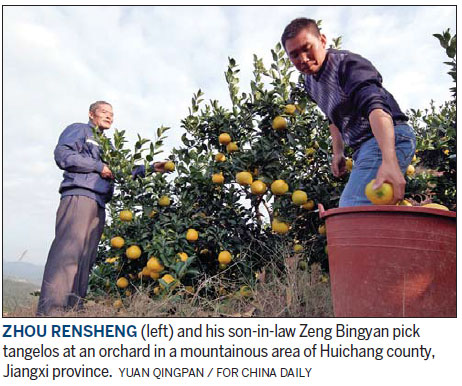Boasting a mild, subtropical climate and relatively acidic soil, Huichang county in Eastern China's Jiangxi province - whose population of 520,000 mostly comprises members of the Hakka ethnic group - has developed more than 16,000 hectares of hillside citrus orchards. The fruit has allowed many residents to escape the poverty trap.
In the 1990s, Zhonggui village, which is home to 2,780 people, was impoverished as a result of a dwindling labor force, lack of commercial crops and poor transportation infrastructure that left roads impassable at times. Almost half its families lived below the poverty line.
Now, the village, one of 19 rural townships in Huichang, lies at the heart of a 666-hectare farm where the locals grow tangelos, a hybrid of tangerine and pomelo, or grapefruit.
The shift to fruit cultivation happened after an experiment in the small orchard of farmer Rao Mingrong in the late 1990s. Along with a few other residents, Rao tried grafting grapefruit branches onto a couple of tangerine trees in his yard. To his delight, the crossbreeds bore delicious hybrid fruit with bright yellow skins far sooner than expected.

Based on the first few hybrids and with help from village cadres and agronomists, Rao - now the biggest grower of tangelos in Huichang - mastered grafting techniques and learned how to fertilize the trees and adjust soil acidity. Since 2011, he has inspired 386 local households to plant the fruit.
Ma Yuncai is one of the people Rao helped. The 58-year-old began cultivating tangelos in 2013 as a way of repaying heavy debts incurred for expensive medical treatments for his son, who is partially paralyzed by severe inflammation of the vertebrae.
"All the money the family made and saved by planting rice was consumed by the medical bills. My life really was hopeless," Ma says.
In 2013, Ma's plight was noticed by the local government's poverty alleviation campaigners, who offered him a one-time subsidy of 300 yuan ($43) per mu to buy pesticides and fertilizers.
Now nursing more than 260 grafted tangelo trees, Ma expects to earn 110,000 yuan this season.
"Even if it remains extremely hard to labor in the orchard at my age, I don't feel the effects of the toil because I can see hope once again," he said.
Thanks to the government's push and with guidance from Rao, the area of tangelo orchards has expanded to 300 hectares. With a further 200 hectares devoted to navel oranges, fruit cultivation has contributed more than 64 million yuan ($9.3 million; 8.7 million euros; 7.6 million) to the village since 2014, generating an average net gain of 10,000 yuan for each resident.
About 400 villagers who lived below the national poverty line have shed their impoverished status through the cultivation and sale of the citrus.
Since farmers from surrounding townships, such as Junmenling and Gaopai, joined the Huichang collective, the total area devoted to the cultivation of tangelos has surpassed 2,600 hectares, and the farmers plan to expand to more than 6,600 hectares by 2020.
In that same year, poverty should have been eradicated for the 12,000 households that plant tangelos in Huichang, though about one in 10 remain below the poverty line at the moment, according to Wen Fanghua, deputy director of the Huichang Fruit Industry Administration.
sunxiaochen@chinadaily.com.cn
